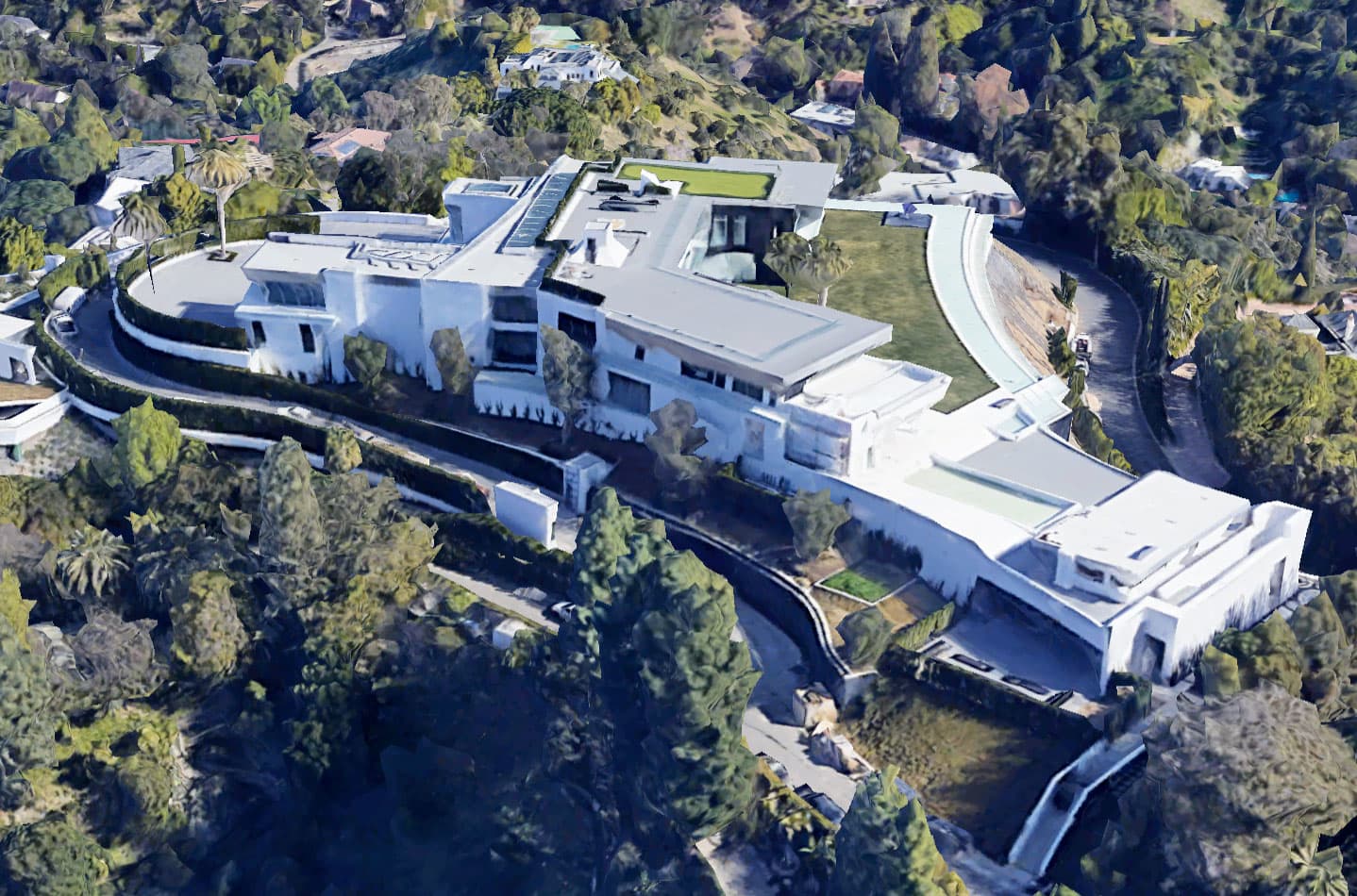A Los Angeles megamansion once expected to list for $500 million has gone into receivership after the owner defaulted on more than $165 million in loans and debt, according to court filings.
The 105,000-square-foot Bel Air estate, known as “The One,” was placed into receivership by the Los Angeles County Superior Court and is expected to be relisted at a lower price in the coming months, according to people familiar with the property.
The receivership marks a stunning reversal for “The One” and its flashy developer, Nile Niami, who often touted the property as his “life mission” and “the biggest, most expensive home in the urban world.”
Expected to hit the market in 2017 with a price tag of $500 million, “The One” has been dogged by repeated delays, funding problems and changing strategies. The home stretches like an ultra-modern palace over eight acres on a hilltop overlooking LA. It has nine bedrooms, multiple kitchens, a nightclub, four-lane bowling alley, salon, gym, 50-seat theater, a running track and an underground garage for 50 cars, with two auto turntables. Its seven water features include multiple pools, a jacuzzi and a moat that surrounds the house. The master bedroom suite is 4,000 square feet. Every door in the house is electric, along with all the toilets. Niami had planned a “jellyfish room” and ice bar but both proved too costly.
“There’s a lot of people out there with a lot of money — they want something no one else can have,” Niami told CNBC in 2017. “This is it.”
Yet “The One” was one of dozens of spec mansions that rose up from the hills of Bel Air and Beverly Hills after 2014, when fashion magnate Bruce Makowsky sold a spec mansion in Beverly Hills for $70 million and kicked off a new California real estate gold rush. The building boom — an arms race of infinity pools, candy walls, auto galleries and party rooms — led to a glut of real estate excess. Many LA megahomes, including several built by Niami, wound up selling for far less than their asking prices.
Even as prices were falling, Niami was loading up on debt to finish and promote “The One.” Over the past four years, Niami and his related LLC, Crestlloyd, have borrowed more than $165 million to build and sell “The One,” according to property documents.
The largest lender is Hankey Capital, founded by Los Angeles billionaire Don Hankey, which has over $115 million in loans on the property. Yogi Securities Holdings, led by doctor-turned-real-estate-investor Joseph Englanoff, has loaned “The One” over $36 million. Two other entities, Inferno Realty and Maybach Corporation Holdings, have provided loans of $7 million each.
“The One” also has over $1 million in unpaid taxes and debts from concrete companies, air conditioning and tool companies.
Hankey served Niami with a notice of default in March. In July, the Los Angeles County Superior Court ordered the property be placed into receivership and named Ted Lanes, of Lanes Management, as the receiver. Under a receivership, a property that’s defaulted is turned over to a court-appointed receiver, who prepares the property for sale. In complex or large real estate projects, receiverships are often preferrable to a foreclosure, where the lender or bank seizes the property.
Rather than taking over ownership and liabilities, which can add to the risks and delays, the receiver gets the needed permits, completes any needed construction work, compiles a list of creditors and prepares the house for a sale to pay off the lenders. A receivership also provides a notice period, when lenders, creditors and contractors who haven’t been paid can make their case.
Once he gets the proper permits and certificate of occupancy for “The One,” it will be listed, Lanes said. The price and timing has yet to be determined, he said.
“What I would love to see happen is that the house gets completed, the certificate of occupancy is awarded and we have an orderly sale that maximizes the value,” he said. “Hopefully, there will be sufficient proceeds from the sale to fund the secured and unsecured creditors and for the equity to realize some value.”
Niami has been marketing “The One” for years, with interviews and photos in the media and a special video tour in April with YouTube personality Michael Blakey, who touted the “$500 million property” as “the biggest and most expensive house in the world.” Niami also talked about plans to turn the home into a media stage and commercial venture, using it to host a potential Netflix show, events and start-up companies.
Niami put his West Hollywood home in bankruptcy last year and a spec-mansion in Beverly Hills, which he had marketed for $100 million wound up selling for $38 million to Englanoff, who was one of the lenders on the California property.
Niami had a listing agreement for “The One” with LA brokers Aaron Kirman and Rayni and Branden Williams, of the Williams & Williams Estates Group. Lanes said the plan under the listing agreement had been to market the property for $288 million, but the ultimate listing price has not been set.
It’s unclear whether the property will sell at a high enough price to pay all the debt. The most expensive home ever sold in LA was the former Warner Estate in Beverly Hills, sold last year to Jeff Bezos for $165 million. While the real estate market in Los Angeles has rebounded after Covid, especially at the high end, “The One” may prove difficult to sell at the asking price.
“It’s not an easy property to price,” Lanes said. “It’s truly unique.”
